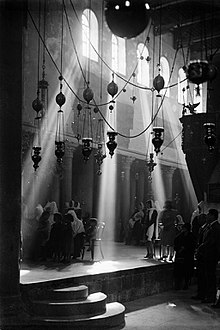Church of the Nativity
| Church of the Nativity | |
|---|---|

The interior of the Church of the Nativity as photographed by Lewis Larsson of the American Colony, Jerusalem
|
|
| Basic information | |
| Location | Bethlehem |
| Geographic coordinates | 31°42′15.50″N 35°12′27.50″E / 31.7043056°N 35.2076389°ECoordinates: 31°42′15.50″N 35°12′27.50″E / 31.7043056°N 35.2076389°E |
| Affiliation | Shared: Greek Orthodox, Armenian Apostolic, and Roman Catholic with minor Syriac and Coptic rights |
| Country | Palestine |
| Status | Active |
| Architectural description | |
| Architectural type | Byzantine (Constantine the Great and Justinian I) |
| Architectural style | Romanesque |
| Groundbreaking | 325 |
| Completed | 565 |
| Official name: Birthplace of Jesus: the Church of the Nativity and the Pilgrimage Route, Bethlehem | |
| Type | Cultural Heritage |
| Criteria | iv, vi |
| Designated | 2012 |
| Reference no. | 1433 |
| State Party | Palestine |
| Region | Western Asia |
The Church of the Nativity is a basilica located in Bethlehem, West Bank.
The church was originally commissioned in 327 by Constantine the Great and his mother Helena over the site that was traditionally considered to be located over the cave that marks the birthplace of Jesus. The Church of the Nativity site's original basilica was completed in 339 and destroyed by fire during the Samaritan Revolts in the 6th century. A new basilica was built 565 by Justinian, the Byzantine Emperor, restoring the architectural tone of the original. The site of the Church of the Nativity has had numerous additions since this second construction, including its prominent bell towers. Due to its cultural and geographical history, the site holds a prominent religious significance to those of the Christian faith.
The site of the Church of the Nativity is a World Heritage Site, and was the first to be listed under Palestine by the United Nations Educational, Scientific and Cultural Organization (UNESCO). The site is also on UNESCO's List of World Heritage in Danger.
The holy site, known as the Grotto, that the Church of the Nativity sits atop, is today associated with the cave in which the birth of Jesus of Nazareth is said to have occurred. In 135, Hadrian is said to have had the Christian site above the Grotto converted into a worship place for Adonis, the Greek god of beauty and desire. A father with the Church of the Nativity, Jerome, noted before his death in 420 that the holy cave was at one point consecrated by the heathen to the worship of Adonis, and that a pleasant sacred grove was planted there in order to wipe out the memory of Jesus. Although some modern scholars dispute this argument and insist that the cult of Adonis-Tammuz originated the shrine and that it was the Christians who took it over, substituting the worship of Jesus, the antiquity of the association of the site with the birth of Jesus is attested by the Christian apologist Justin Martyr (c. 100 – 165 ), who noted in his Dialogue with Trypho that the Holy Family had taken refuge in a cave outside of town:
...
Wikipedia
